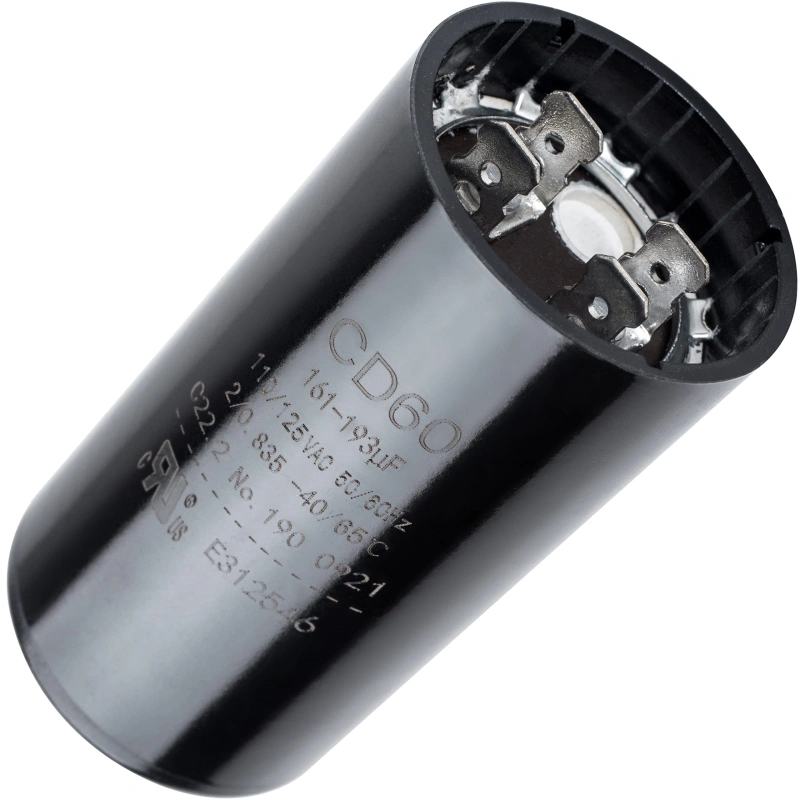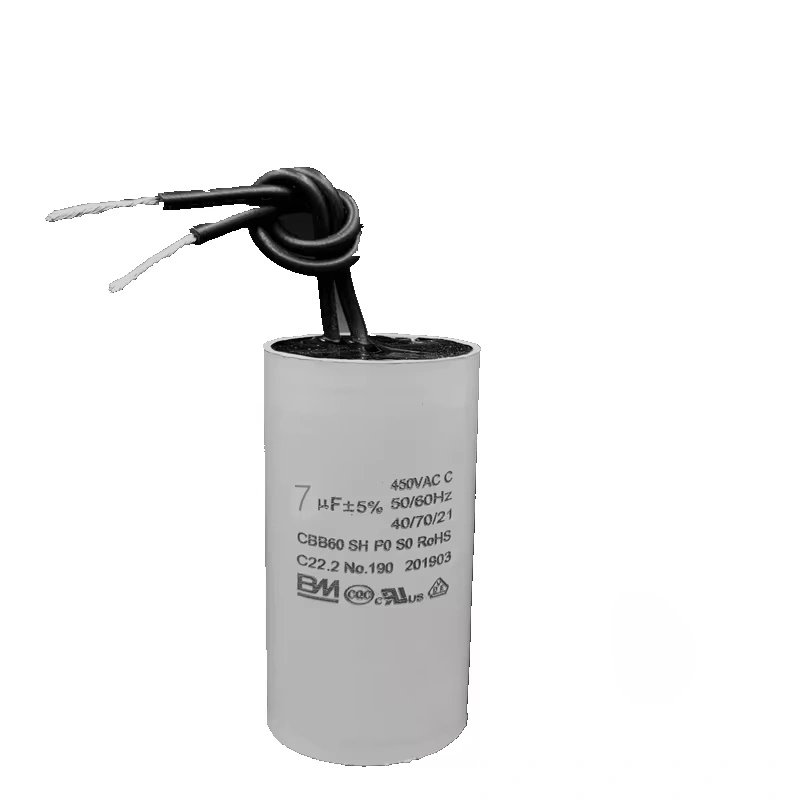Well Pump Capacitor
A Well Pump Capacitor plays a crucial role in starting and running your well pump efficiently. It provides the necessary power boost during startup and helps maintain smooth motor operation. Without a properly functioning capacitor, your well pump may struggle to start or run, leading to inefficiency and potential damage. Don’t compromise your pump’s performance—ensure your Well Pump Capacitor is in top condition. Ready to optimize your pump? Check your capacitor today!
Get Water Well Pump Capacitors with Affordable Prices
A Water Well Pump Capacitor is vital for giving your well pump motor the boost it needs to start and run efficiently. It provides the necessary surge of power at startup and ensures smooth, consistent operation, preventing motor strain. For maximum pump performance, trust the quality of Water Well Pump Capacitors from Weishi. Get yours today!

start capacitor well pump
A start capacitor is a vital component that delivers the initial power boost your well pump motor needs to start smoothly. Our high-quality start capacitors are engineered to enhance your pump’s efficiency and longevity. Experience superior performance, reduced energy consumption, and worry-free operation. Upgrade your well pump today and harness the power of our reliable start capacitors.
Deep Well Pump Capacitor
A deep well pump capacitor is a vital component that ensures your pump starts smoothly and runs efficiently. Our high-quality capacitors deliver superior performance, extended motor life, and reduced energy consumption. Experience the difference with our durable and dependable capacitors. Upgrade your deep well pump system today and enjoy a consistent water supply.

Well Pump Capacitor Working Principle
1. Initial Power Boost:
A well pump capacitor is like a superhero’s secret weapon, providing the initial burst of power needed to launch your motor into action. It stores electrical energy and releases it in a forceful surge, ensuring a smooth and reliable start, even in demanding conditions.
2. Phase Shift Creation:
To get your motor spinning, you need a little electrical magic. Our capacitors create this magic by shifting the current in the motor’s starting winding. This shift, known as a phase shift, creates a difference between the main and starting windings, setting the stage for the next step.
3. Magnetic Field Generation:
This phase shift is like a conductor’s baton, orchestrating a symphony of electricity. It generates a rotating magnetic field that cuts through the motor’s rotor. This interaction induces a current in the rotor, propelling it into action and setting the wheels of your well pump in motion.
4. Efficient Operation:
Once your motor reaches its operating speed, it’s time to let it shine on its own. A centrifugal switch, a clever little device, disconnects the capacitor from the circuit. This allows your motor to run efficiently, conserving energy and delivering peak performance, ensuring a reliable water supply for your home or business.
Well Pump Capacitor Applications
Residential Well Pumps:
Elevate your home’s water supply with our powerful capacitors. They provide the essential energy boost to ensure your well pump delivers a consistent flow of water, powering showers, sinks, and appliances. Experience the convenience of reliable water, thanks to our high-performance capacitors.
Commercial Pumps:
Keep your business running smoothly with our robust capacitors. They power commercial pumps, ensuring a reliable flow of water for cleaning, sanitation, HVAC systems, and other essential operations. Experience the peace of mind that comes with a well-powered commercial water system.
Municipal Water Systems:
Ensure a reliable and safe water supply for your community with our dependable capacitors. They power the pumps that distribute clean water to homes and businesses, contributing to a thriving and healthy community.
Agricultural Pumps:
Maximize your agricultural output with our dependable capacitors. They provide the crucial power boost to keep your pumps running efficiently, irrigating vast fields and watering livestock. Experience the difference of a well-powered agricultural system, resulting in bountiful harvests and thriving livestock.
Industrial Pumps:
Power your industrial processes with our high-performance capacitors. They support critical manufacturing processes, cooling systems, and other vital operations. Experience the reliability and efficiency of a well-powered industrial water system.
Booster Pumps:
Boost your water pressure with our powerful capacitors. They power booster pumps, increasing water pressure in various applications, from homes and businesses to fire protection systems. Experience the power of increased water pressure, ensuring optimal performance and safety.
Bad Well Pump Capacitor Symptoms
Frequent Cycling:
A bad capacitor can cause your well pump to work overtime, cycling on and off more frequently than normal. This excessive cycling leads to increased wear and tear on your pump motor, reducing its lifespan and potentially causing costly repairs.
Delayed Start:
A bad capacitor can delay your well pump’s start-up time or even prevent it from starting altogether. This can leave you without water when you need it most, causing significant inconvenience and potential damage to your plumbing system.
Overheating:
A bad capacitor can cause your well pump motor to overheat, leading to decreased efficiency and potential damage to the motor’s internal components. Overheating can significantly shorten the lifespan of your pump motor and lead to costly repairs.
Weak Water Pressure:
A faulty capacitor can weaken the power delivered to your well pump motor, resulting in reduced water pressure. This can make everyday tasks like showering and watering your lawn frustrating and inconvenient.
Loud Humming Noise:
A faulty capacitor can cause your well pump motor to produce an unusual humming noise. This noise is a clear indication that your capacitor is failing and needs to be replaced to avoid further damage to your pump.
Tripping Circuit Breaker:
A faulty capacitor can draw excessive current, causing your circuit breaker to trip frequently. This can disrupt your water supply and inconvenience your daily routine. Replacing a bad capacitor can help prevent these frustrating power outages.
Well Pump Capacitor Troubleshooting
A faulty capacitor can cause a range of issues with your well pump, including frequent cycling, weak water pressure, delayed starts, loud humming noises, overheating, and tripping circuit breakers. To troubleshoot a potential capacitor issue, start by turning off the power to the pump and visually inspecting the capacitor for physical damage. Use a capacitance meter to measure the capacitor’s capacitance and compare it to the rated value. If the values significantly differ, the capacitor is likely faulty.
Additionally, use a multimeter to measure the voltage across the capacitor’s terminals, ensuring it’s within the specified range. If you confirm a faulty capacitor, replace it by disconnecting the power, unscrewing the old capacitor, mounting the new one securely, connecting the wires correctly, and restoring power. Remember, if you’re unsure about any step of the process, consult a qualified electrician or pump technician.
Well Pump Capacitor FAQs
Where to Buy a Well Pump Capacitor
You can purchase a well pump capacitor at various retailers, both online and in-store. Here are some common places to find them:
- Home Improvement Stores: Retailers like Home Depot, Lowe’s, and Menards often carry a variety of capacitor sizes.
- Plumbing Supply Stores: These stores specialize in plumbing parts and accessories, including well pump capacitors.
- Online Retailers: Websites like Amazon, eBay, and Grainger offer a wide range of capacitors, often at competitive prices.
- Electrical Supply Stores: These stores carry a variety of electrical components, including capacitors.
How to Bypass a Well Pump Capacitor
Warning: Bypassing a capacitor can damage your well pump motor. It’s generally not recommended and should only be done as a temporary measure.
If you’re experiencing issues with your well pump and suspect a bad capacitor, you can temporarily bypass it by directly connecting the two wires that were connected to the capacitor. However, keep in mind that this will significantly reduce the starting torque of the motor, making it harder to start, especially under heavy loads.
How to Test a Well Pump Capacitor
To test a well pump capacitor, you’ll need a capacitance meter. Here’s how to do it:
- Disconnect the Power: Turn off the power to the well pump.
- Discharge the Capacitor: Discharge the capacitor using a screwdriver or a resistor to avoid electric shock.
- Measure the Capacitance: Connect the capacitance meter’s probes to the capacitor’s terminals.
- Compare the Reading: Compare the measured capacitance to the rated capacitance on the capacitor. If there’s a significant difference, the capacitor is likely bad.
What Causes a Well Pump Capacitor to Fail
Several factors can cause a well pump capacitor to fail:
- Age: Over time, capacitors can degrade and lose their capacitance.
- Overheating: Excessive heat can damage the capacitor’s internal components.
- Voltage Surges: Sudden spikes in voltage can stress the capacitor and lead to failure.
- Physical Damage: Physical damage, such as cracks or leaks, can compromise the capacitor’s performance.
- Frequent Cycling: Frequent on-off cycles can accelerate the capacitor’s wear and tear.